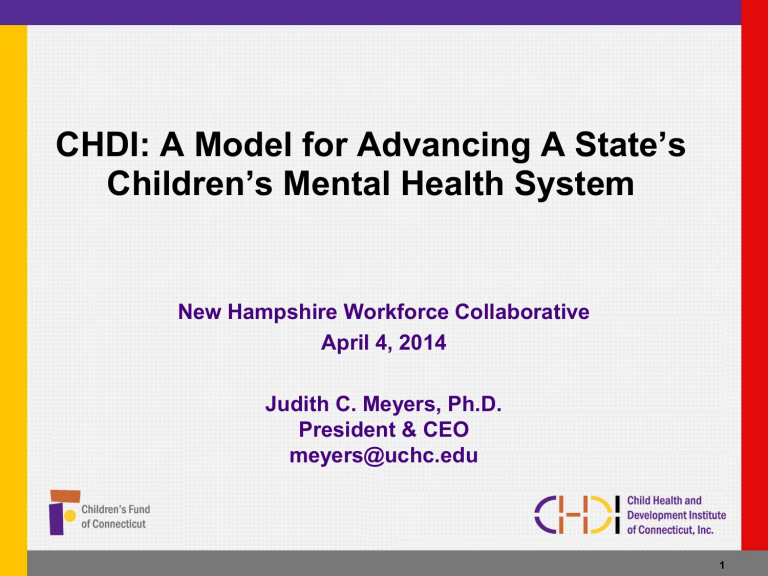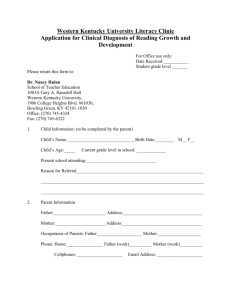CHDI: A Model for Advancing A State’s Children’s Mental Health System

CHDI: A Model for Advancing A State’s
Children’s Mental Health System
New Hampshire Workforce Collaborative
April 4, 2014
Judith C. Meyers, Ph.D.
President & CEO meyers@uchc.edu
1
CHDI Key Features
• Independent not for profit
• Subsidiary of the Children’s Fund of
Connecticut
• Established as partnership with leading academic institutions
• Relationship with CT Children’s Medical
Center
• Over 15 years grown from staff of 1 to 25
• Sources of funding – Children’s Fund,
Grants
CHDI VISION
All children
Health & Mental Health
Care Systems
Effective
Comprehensive
Community
Based
MISSION
Advance and inform sustainable improvements through:
•Programs
•Practice
•Policy
4
Strategy
Long term systemic change
Sustainable innovations and improvements
Partnerships
– Providers
– Policymakers,
– Academic institutions
– State agencies
5
KEY AREAS
Pediatric
Primary
Care
Mental
Health
Treatment
Early
Childhood
6
STRATEGIC GOALS
• Comprehensive, quality health care services for children through the pediatric medical home model
• Comprehensive, community-based, quality mental health care for all children and families
• Full integration of health/mental health systems in a comprehensive approach to children 0-8 in
CT
Strategy: To develop and advance programs, practices and policies that will result in sustainable improvements in primary and preventive health and mental health care in Connecticut
Role and Functions
• Identify best practices
• Systems Design
• Test and evaluate models/demonstrations
• Research/evaluation
• Education and Training
• Securing funding - Grant writing/grants management
• Technical Assistance
• Consultation
• Quality Assurance – data collection/monitoring/
• Policy/Advocacy
• Financing
• Resource to state and communities
• Facilitation/convening
Child Health Services Framework
System Changes
Part C (B-to-3)
Title V (CYSHCN)
Links to Preschool
Special Ed and
Special Ed (LEA)
Medical / Surgical Subspecialty Services
Early Childhood Consultation Services
Developmental / Behavioral Health Services
(Mid-level, Comprehensive Assessments)
Home –based Services
Help Me Grow
Medical Home
Developmental/Behavioral Surveillance & Screening
Family Education/Parent & Child Counseling/Anticipatory Guidance
Literacy Promotion
Health Supervision Services
Oral Health/Dental Home
Nutritional Services
Practice
Improvement
.
Child Health Services Building Blocks
Desired Outcomes for School Readiness
Emotional / Social /
Cognitive Development Physical Health &
Development
Family Capacity and
Function
Early Care and
Education
Programs
Child
Health
Services
.
Prt C (B-to-3)
Title V
Developmental Services
Medical Services
Home –Based Services
Medical Home
[Accessible, Continuous,
Comprehensive, Coordinated,
Family-Centered, Compassionate,
Culturally Effective]
Family Support
Services
Child Healthcare System
Link with other child-serving systems
• Intensive
Clinical
Intervention
• Mid-level Assessment
• Integrated Care Plans with
Subspecialty Care
Integration
• Education & training
• Care coordination
• Capacity building in
practice settings
• Public policy
• Community investments
• Promoting healthy development (nutrition,
oral health, literacy promotion)
• Providing universal screening and referral
• Providing nurturing/responsive relationships
and supportive environments
• Health supervision/anticipatory guidance
• Intensive
Clinical
Intervention
• Mid-level Assessment
• Early Identification/
Intervention
• Promoting healthy socio-emotional
development
• Providing universal s-e screening and
referral
• Providing nurturing/responsive relationships
and supportive environments
Link with other child-serving systems
Child Health Child Mental Health
CHDI Workforce Development Initiatives
• Pre-service
– Current trends Course
• In-service
– EPIC
– Learning Collaborative Model (TF-CBT; Child FIRST)
– Training and TA – Wraparound; Care Coordination
– MATCH – ADTC;
– EMPS Quality Improvement
• Developing and embedding models in other systems
– Infant MH Endorsement in CT
– CONCEPT
– School Based Diversion Initiative
• Fellowships – graduate/post graduate
Adult Learning Principles
Educating Practices in the Community
(EPIC)
• Brings timely information and training to child health professionals to change their practices
• Practice-based for entire office team
• Emphasis on practice change using clinical information, tools, resources
• Topics for which there are resources to address
• Modules:
– Universal BH screening – tools and strategies for primary care
– Brief BH counseling in primary care for less complex concerns
– Connecting children to local behavioral health services
– Developmental Screening
– Autism Screening
– Maternal Depression
• Maintenance of Certification
Learning Collaborative Overview
• Learning collaborative approach is an implementation and quality improvement model
• Based on the Breakthrough Series Collaborative developed by the Institute for Healthcare Improvement
(IHI)
• Diverse implementation teams from each agency
• Intensive training / consultation process (9 – 12 months)
• Use of data and implementation science
Current Trends in Family Intervention:
Graduate Course
• Developed by Wheeler Clinic
• Funded by MH T-SIG Grant
• 14-weeks
• 3 credits
• Curriculum
• Instructor’s Toolkit
• Training fellowships for Instructors
• 17 faculty/11 institutions trained as of 2012
• Required or regularly scheduled elective
• Provides exposure
• Exposure/experience/expertise
Top Ten Learnings: 1-5
1. The field has changed dramatically but professional training has not kept up. Embed new models into graduate training.
2. Shortage of qualified professionals – Expand definition of workforce
3. Skill building is not sufficient if systems and culture don’t change in tandem
4. To advance practice change, need to work at policy and systems level
5. High turnover – work is never done – build in models of sustainability
Top Ten Learnings: 6 - 10
6. Need advocacy to support sustainability
7. Support an outcomes approach and disseminate information about results (RBA effective tool in CT)
8. Partner with philanthropy – source for infrastructure, training, convening, planning, organizational support, scholarships
9. Incorporate families at every level
10. Usefulness of an intermediary (backbone) organization
Issues for Consideration
• Home
• Partnerships
• Governance
• Focus
• Functions
• Staffing
• Target Audience/Stakeholders
• Funding Sources
“We have learned to create the small exceptions that can change the lives of hundreds. But we have not learned how to make the exceptions the rule to change the lives of millions.”
Lee Schorr


